Tron: Identity Review (PC) – A Narrative Threadripper
Bithell Games are certainly making a name for themselves for taking established IP’s and doing the unexpected with them. With John Wick Hex, they took a film series world renown for its thrilling action, and crafted a thoroughly engaging hex-based strategy game with it. It would have been easy to make a John Wick first or third person shooter and call it a day. Instead, they did something more cerebral. Now they turn their attention to an iconic Disney series in the shape of ‘Tron: Identity’. Once again, they’ve done the unexpected.
If you were to list the reasons why Tron and its sequel are so highly celebrated, a few things likely come to mind. Light cycles. Disc battles in The Games. The aesthetic. Music. Nostalgia. Tron: Identity touches on all of those to some degree, but focuses on aspects that probably come further down the list: Tron’s high concept and its lore. A visual novel adventure, this game delves into what it means to be a program on the Grid by propelling you through a branching narrative full of twists and turns.
Fight For The Users? What Users?
Tron: Identity takes place on a Grid that has yet to be explored in any of the movies or games. On a backup server, this Grid knows of its creator but has been left to run and evolve without human involvement. You control the decisions of a program called Query, a ‘Disciple of Tron’ who acts as a detective and seeker of truth that operates outside of the existing governing systems.
It’s a rain slick night when Query is called to a tower at the centre of the Grid called ‘The Repository’. There’s been an explosion. A vault lies exposed. Something has seemingly been stolen. It’s your task to uncover the culprit and identify what was stolen. There’s a few hitches in the code however; suspects are few and far between, and because of the secrecy regarding the contents of The Repository, nobody is quite sure of what was taken. That’s hampered further by the corrupted and damaged memories of those close to the blast, leading to some amnesia. The quest for truth won’t be straightforward.
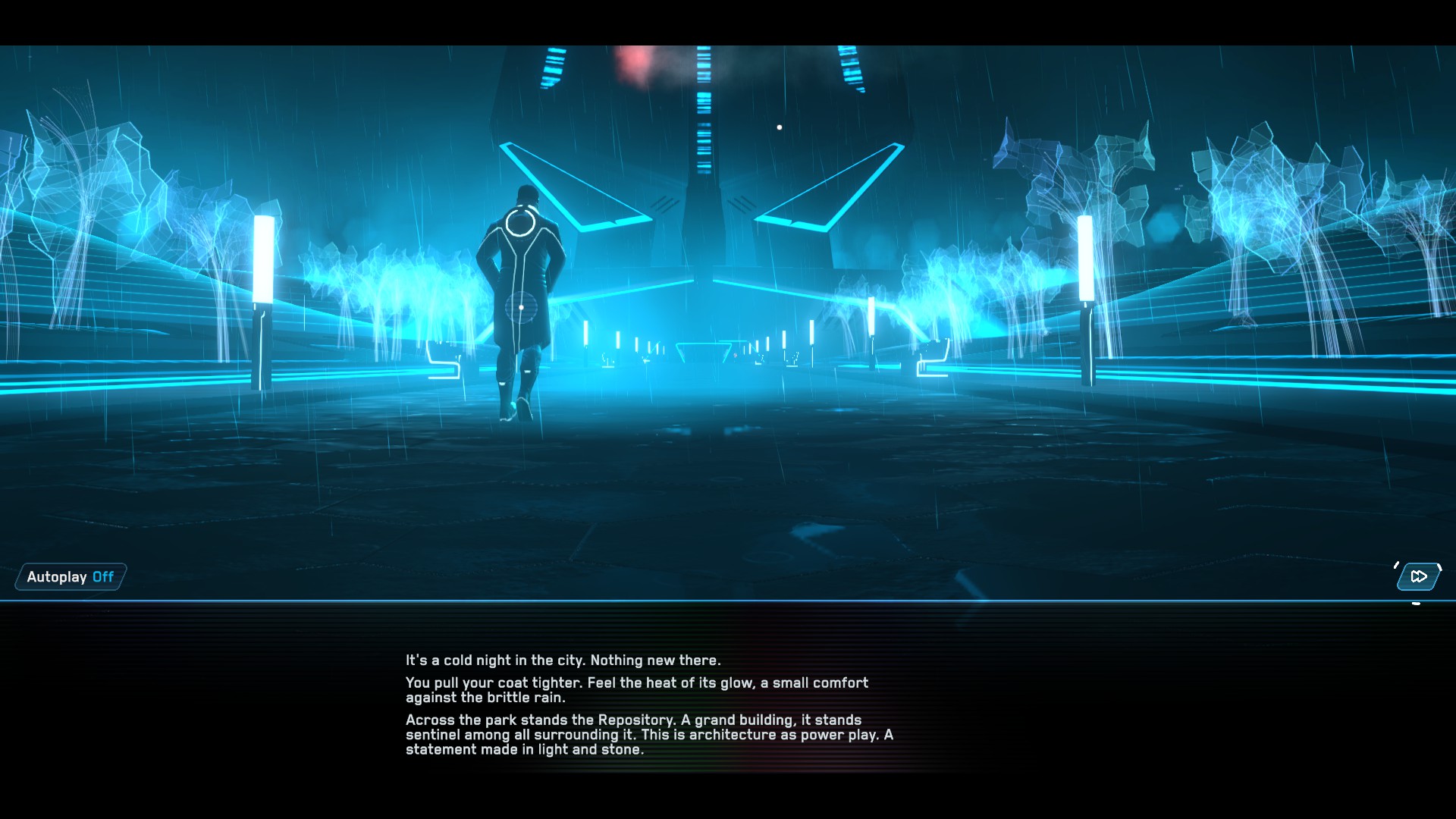
I know that it’s a tired analogy at this point but Tron: Identity’s mystery is steadily peeled back like the layers of an onion. You’ll initially be meeting the cast within The Repository in turn to get a feel for them. Your first examination with these characters sets the scene but you won’t glean enough to know anything for sure. Everyone will still be a suspect or a person of interest. Slowly but surely, you’ll uncover nuggets of truth which will help you navigate the investigation.
Disc-overing The Truth
Between conversations, you can choose where to head next from the 5 available locations around The Repository. Each location is initially associated with particular characters but as the story evolves, the cast may pop up in other locales too. As you learn new bits of data from interviews or make decisions (more on this in a second), this will influence your relationship and interactions with others. As a Disciple of Tron, you’ll also get the opportunity to restore the lost memories of the cast impacted by the explosion.
The process of Defragmenting a character’s memories is presented as a unique card based mini-game. When characters hand you their disc, a series of cards are presented in a semi-circle. The aim of this game is to reduce the number of cards to a target number. To do this, you move cards from their location to knock another card off the circle. You can do this to the cards either directly besides the card you’re moving, or by those that are 3 spaces away, but only if that card has the same suit or number on it.
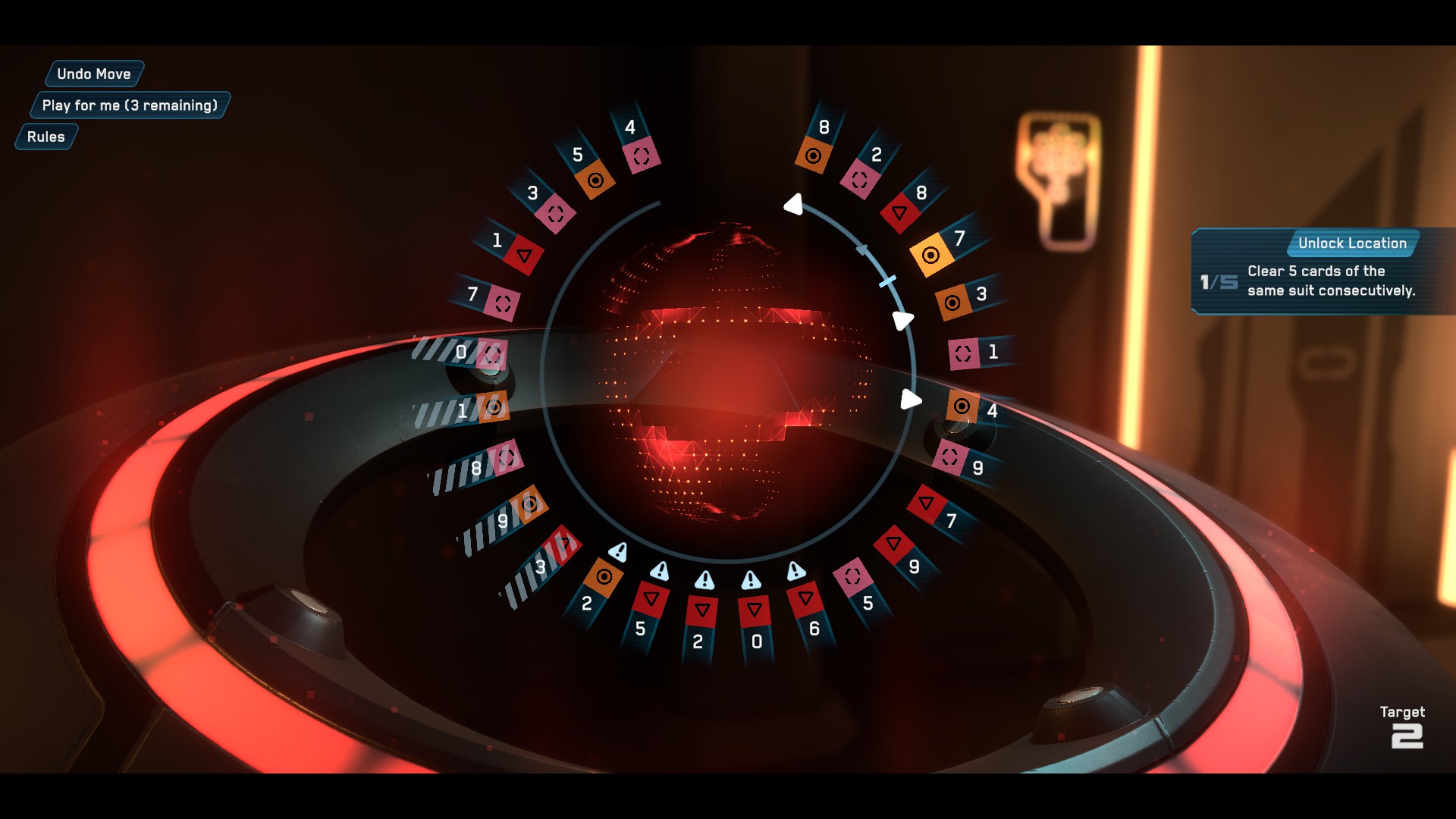
The Defrag mini-game within Tron: Identity is an interesting twist on Solitaire and is impressive in its design. As you progress through the game, the mechanics of this evolve, introducing new elements to consider. Some cards will swap places after each turn, spacers will appear to mess with your strategy and some cards will spawn others if they’re not taken out before a turn-counter fills.
Despite the increased complexity, the Defrag game doesn’t ever become what I would describe as difficult. Once you’ve become accustomed to the admittedly unique mechanics, it’s possible to smash through all of these puzzles in a few minutes. If I’m honest, I would have like to have seen the Defrag games have more of a challenge to them. As a side activity however, they’re very accessible as they are right now. If you do want a helping hand, or are only here for the story, you can undo moves at any time, ask for limited AI assistance, or skip the mini-game entirely.
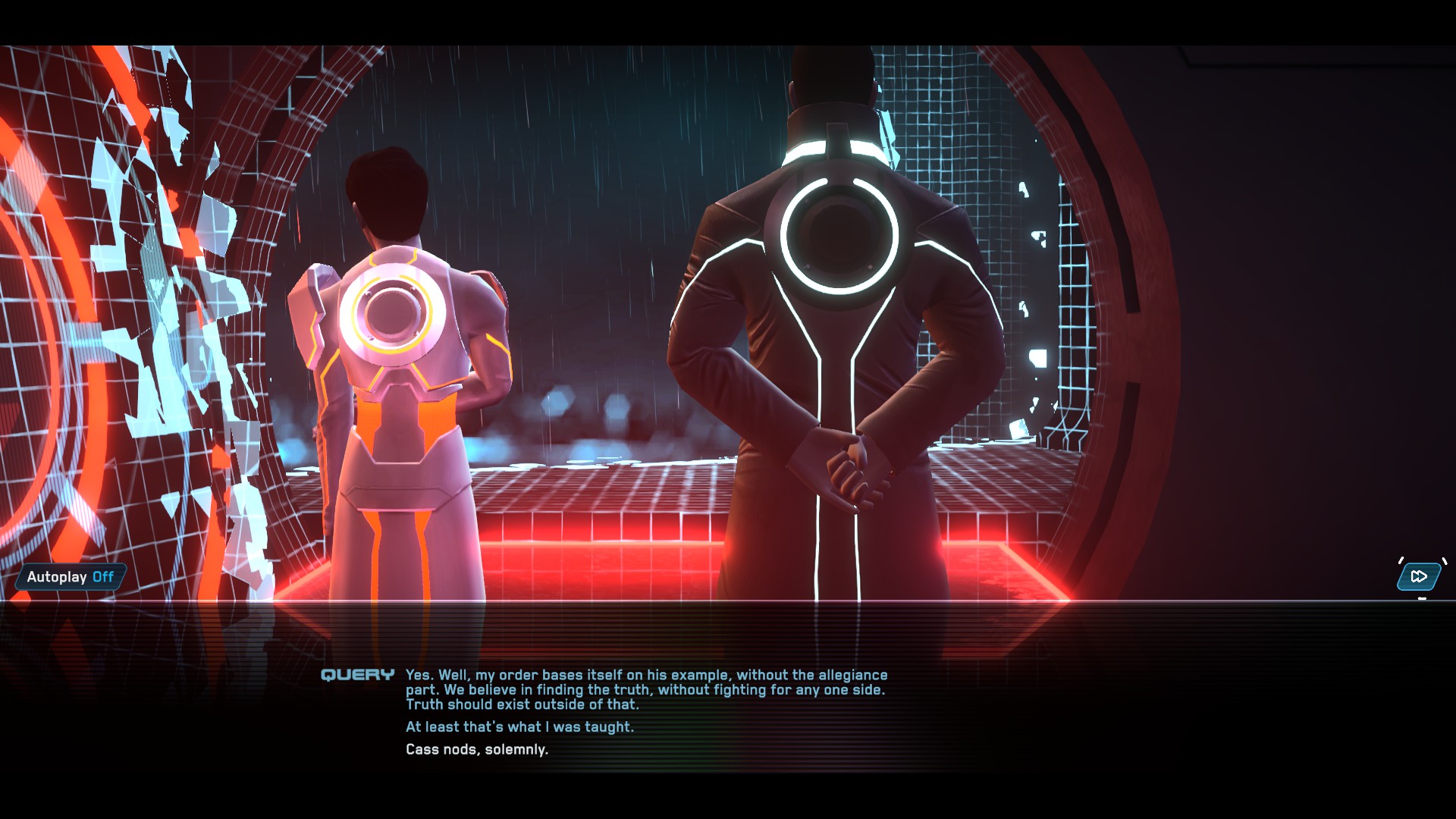
Branching Code Strategy
While the Defrag mini-game is an interesting diversion, the core of Tron: Identity is assuredly its story. Told via text passages that scroll into a panel at the bottom of the screen, the narrative is accompanied by a visual diorama of the events unfolding above it. There’s no voice acting. There’s no flashy cutscenes. It’s a very direct and purposeful design that knows what it wants to achieve and does so admirably.
At numerous junctures in the game, you’ll have to make decisions. Actually getting involved in events, preventing crimes from occurring, is outside of Query’s prevue. Unfortunately, the program finds itself in an active situation where things are still developing, so even deciding to do nothing and stay out of things is still seen as a decision in the eyes of other characters.
These decisions are almost universally binary, presenting you with a set of paths forward. These choices can have far reaching consequences, from altering a characters perception of Query, right through to deciding the fate of the cast of characters you’ve been questioning. Upset a character with your actions and they’ll act differently at later junctures, compared to when they trust or respect Query.
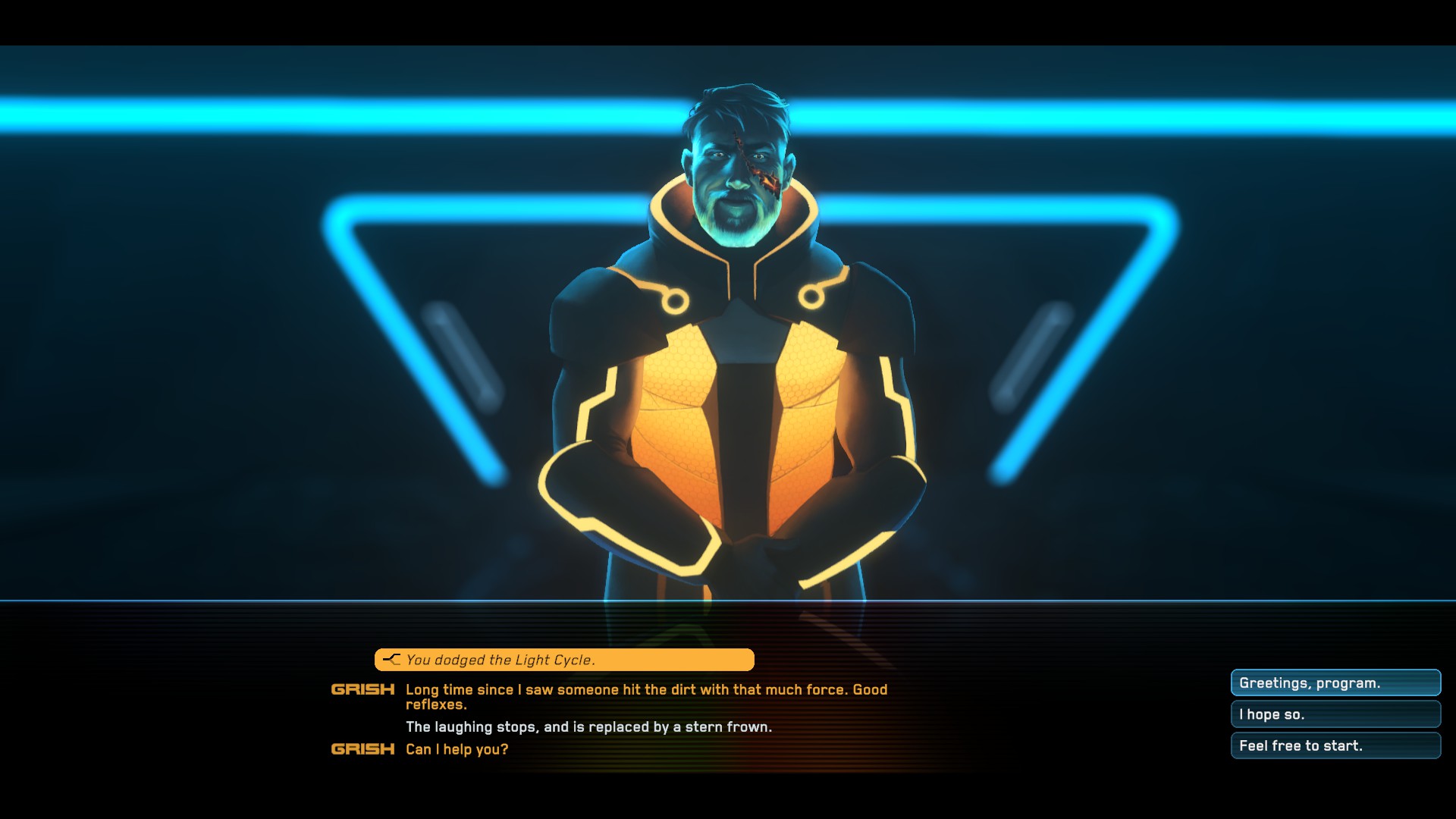
Characters.exe
The cast you’ll meet during Tron: Identity are all well realised and are interesting to get to know. From the curt and steadfast security chief Grish to the Flynn obsessed zealot Prinz, these characters all come with their own unique motivations, histories and colour.
That last point is both figurative and literal, as the game smartly associates a unique hue for each character, making it easy for the player to identify who’s on screen and who’s talking during exchanges of dialogue.
I won’t spoil the narrative of Tron: Identity, but I do feel the need to complement the way in which it’s written and structured. The characters and lore of the game feel deep, and the way in which the game gradually unveils its mysteries is quite compelling. It’s an easy setting, cast and circumstance to get invested in.
As you might expect from a game with a branching narrative, your choices will lead you to a number of different fates/endings for Query and the other characters. Because there are a number of different endings, Tron: Identity is highly replayable; after I finished my first run through of the game, I immediately restarted the game and finished it again, getting a very different ending. I’ve completed it a few more times since.
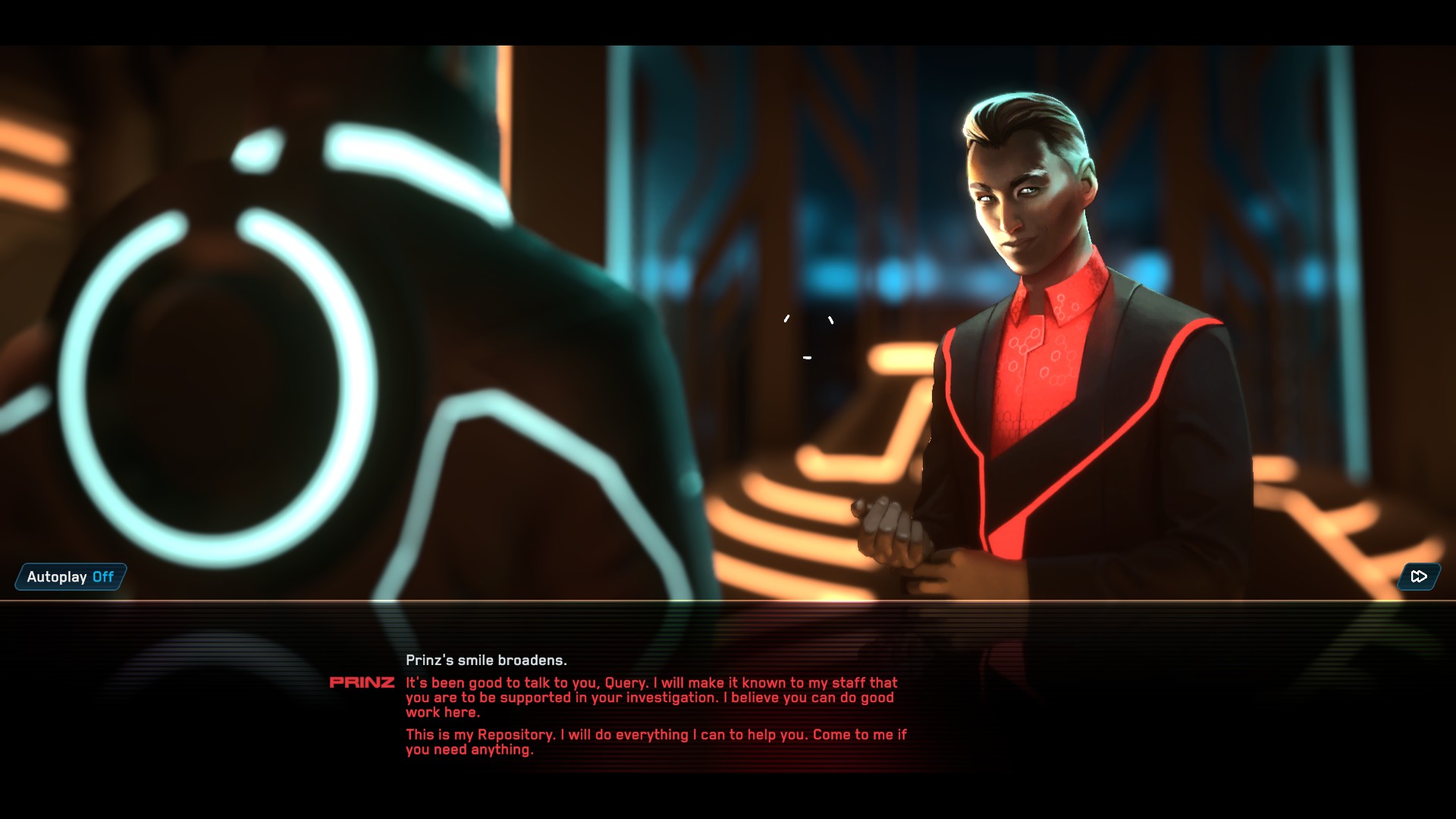
My only gripe with these endings, or in fact with Tron: Identity as a whole, is that some of these endings don’t feel like ‘endings’ at all. A number of them feel more like the first chapter of something bigger, inferring what might come next but leaving the wider consequences of my decisions unexplored. Having become so invested in the lore, story and characters, it’s unsatisfying to be left with questions unanswered or a future simply hinted at. This of course leaves ample room for a sequel (and if you’re reading this Bithell Games and/or Disney – yes, please), but I certainly would have preferred more definitive and self contained narrative end points.
Tron: Identity’s Familiar Identity
What’s certainly not unsatisfying about Tron: Identity is its aesthetic. Taking its cues from the famous movies, the game looks fantastic. The digital dioramas displayed at the top of the screen are consistently impressive, bringing to almost-still-life the neon streaked sci-fi world of Tron as we’ve come to know it. The clean, mechanical, almost clinical environments could easily be imagined in a big budget movie. Similarly, the character designs are all interesting and complement their personalities well.
The audio and music of Tron: Identity might be my favourite facet of the entire game. Dan le Sac has picked up the baton that Daft Punk laid down and has ran with it into some truly excellent places here. Each location of the game has its own score, supplementing the visuals and tone of each area perfectly. Prinz’s office, for example, has a choral, almost religious song attached to it, heightening the feeling that it’s essentially an alter to Flynn and the Users. In contrast, the music within the Library is peaceful yet complex, representing the room’s function and its occupants. It’s most impressive when this music is layered, building and evolving upon itself to increase tension or change the mood.
Before I wrap up this review, I also feel like I need to complement how well thought-out the lore within Tron: Identity is. This game feels like a natural and creative extension of everything we know of the world of Tron to date, and contains some insightful new content that’s essential for fans of this series.
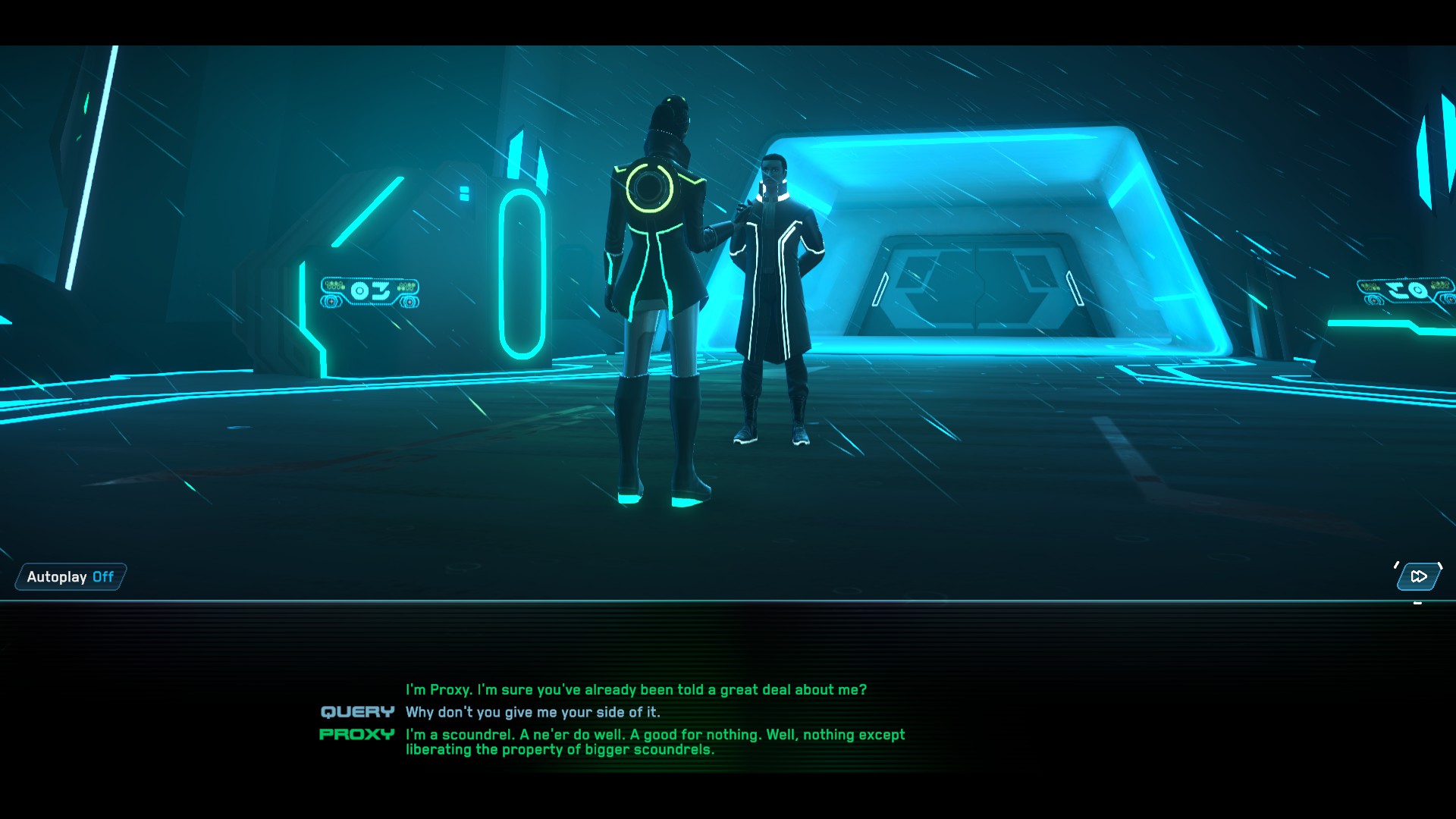
End Of Line
To summarise, Tron: Identity feels like a game that only Bithell Games could have created. As an experience, it’s like a culmination of all of their work to date. That all begins with finding a creative way to use an IP beyond the most obvious, similar to the way they did with John Wick. That’s supplemented by the kind of thought provoking design, interesting characters and smart script you’ll find in the Circular games or North Star Rising. The art style and music, while taking inspiration from the source material, feel like a practiced evolution of that source, likely informed by Volume and others. You can sense the DNA of The Solitaire Conspiracy within the Defrag mini-game.
Even if you have no interest in Tron, but have enjoyed other works by Bithell Games, you’ll likely enjoy Tron: Identity because it is unreservedly a ‘Bithell Games’ game. If you simply like Tron and could see yourself playing a short, narrative focused game rather than dreaming of disc battles or light cycle races, you’re in for a treat. It’s not quite perfect, but I’ve thoroughly enjoyed my time with Tron: Identity and I hope that this team get to revisit this IP again to tell more original stories from the Grid.
Some of its endings might leave you feeling a little derezzed, but the branching narrative journey you take to get there makes Tron: Identity an experience worth having. Thought provoking writing and incredible music are coupled with an enjoyable card game in a tale that tackles new frontiers in the world of Tron which will be essential for those that ‘fight for the user’.

Tron: Identity is launching on PC (review platform) and Nintendo Switch on April 11th, 2023.
Developer: Bithell Games
Publisher: Bithell Games
Disclaimer: In order to complete this review, we were provided with a promotional code from the publisher. For our full review policy, please go here.
If you enjoyed this article or any more of our content, please consider our Patreon.
Make sure to follow Finger Guns on our social channels – Twitter, Facebook, Twitch, Spotify or Apple Podcasts – to keep up to date on our news, reviews and features.

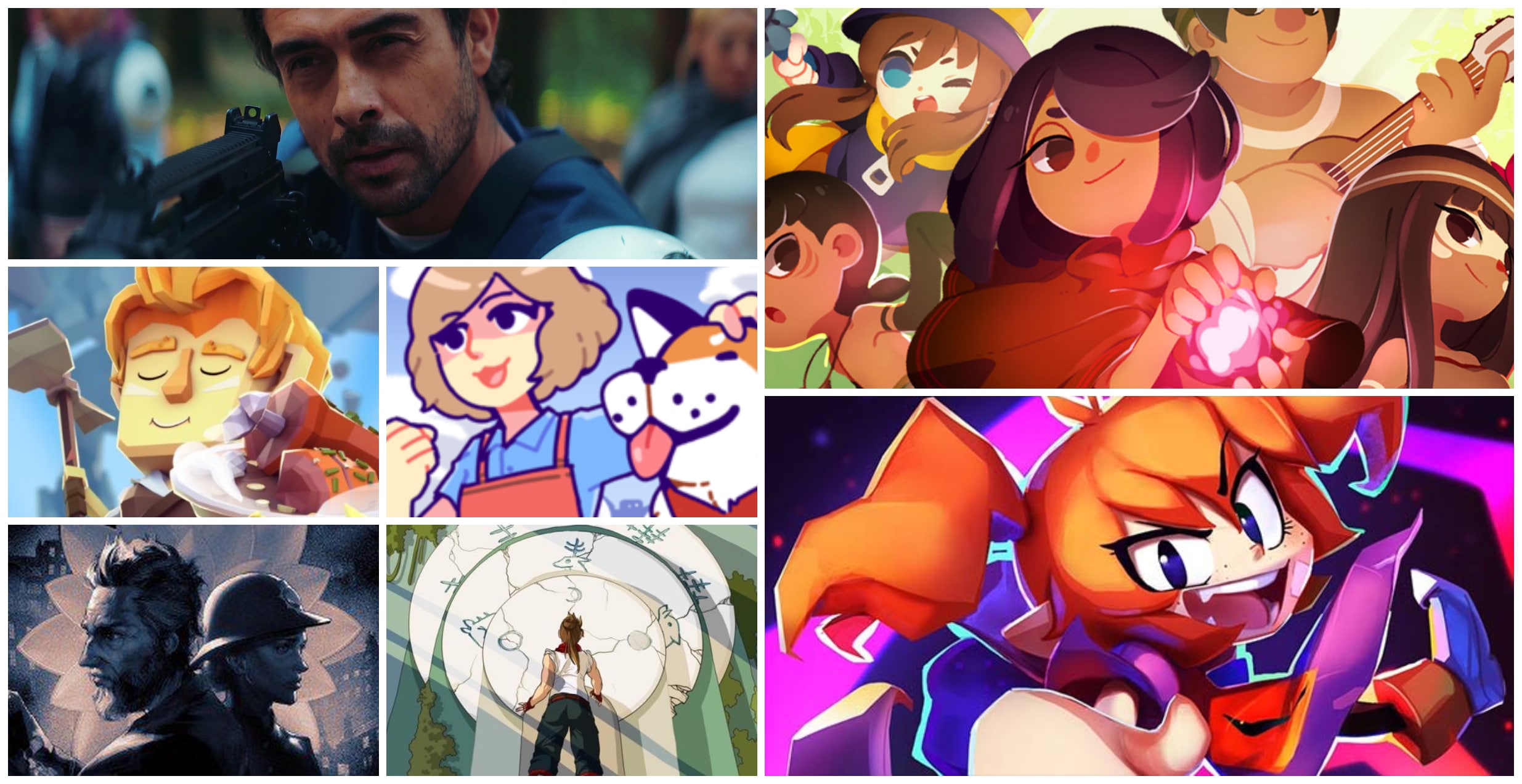
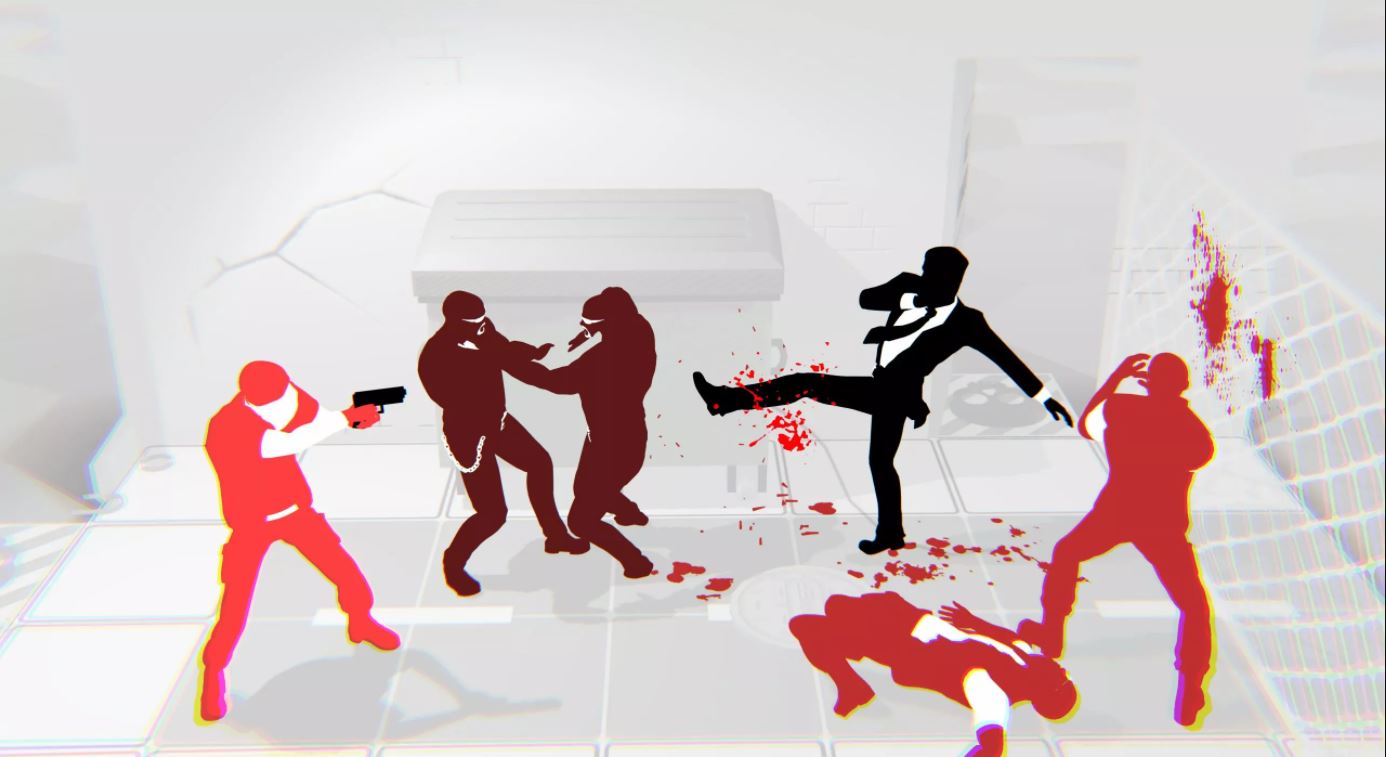
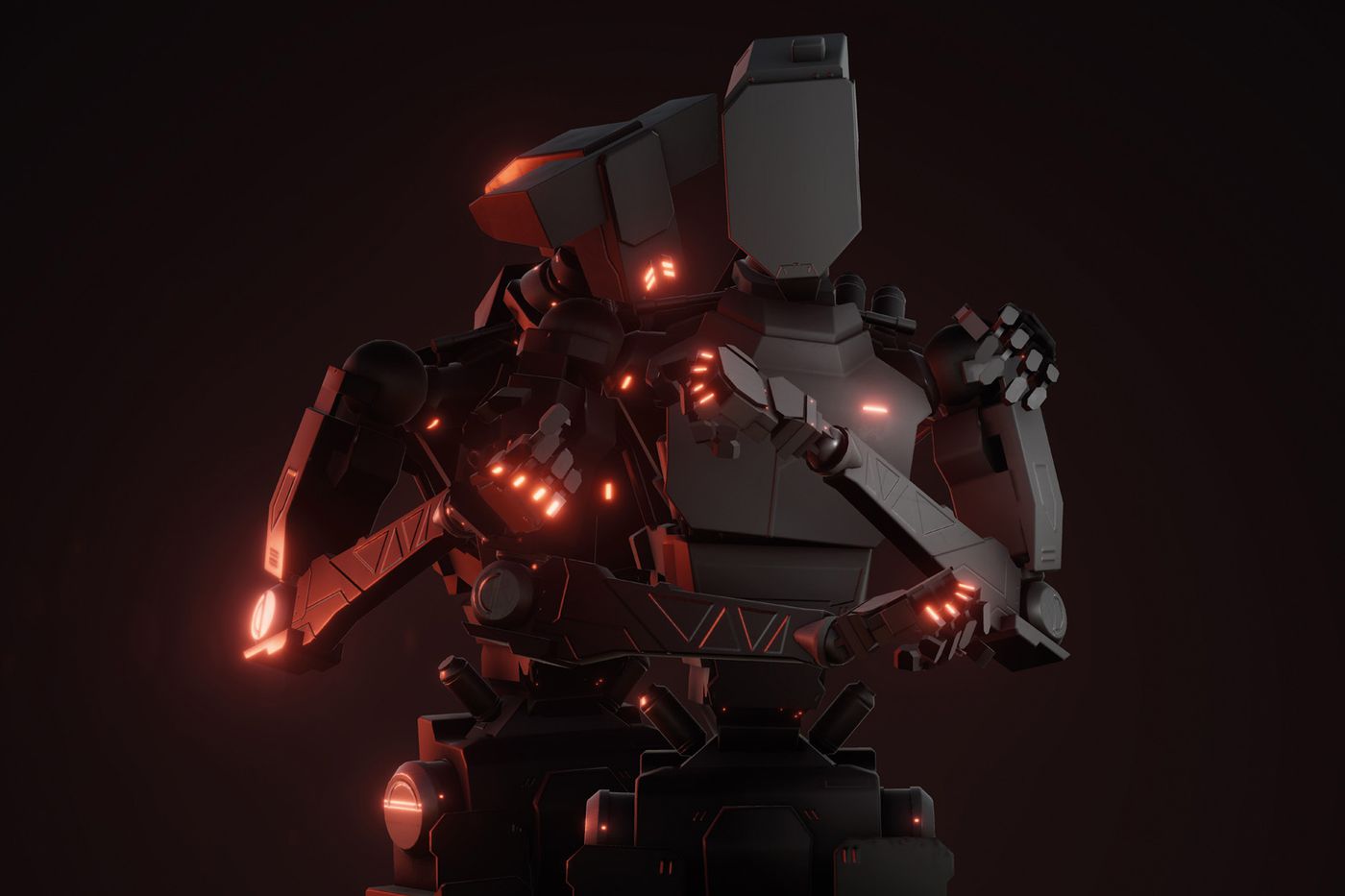
This sounds really promising. I’m going to have to pick it up now!